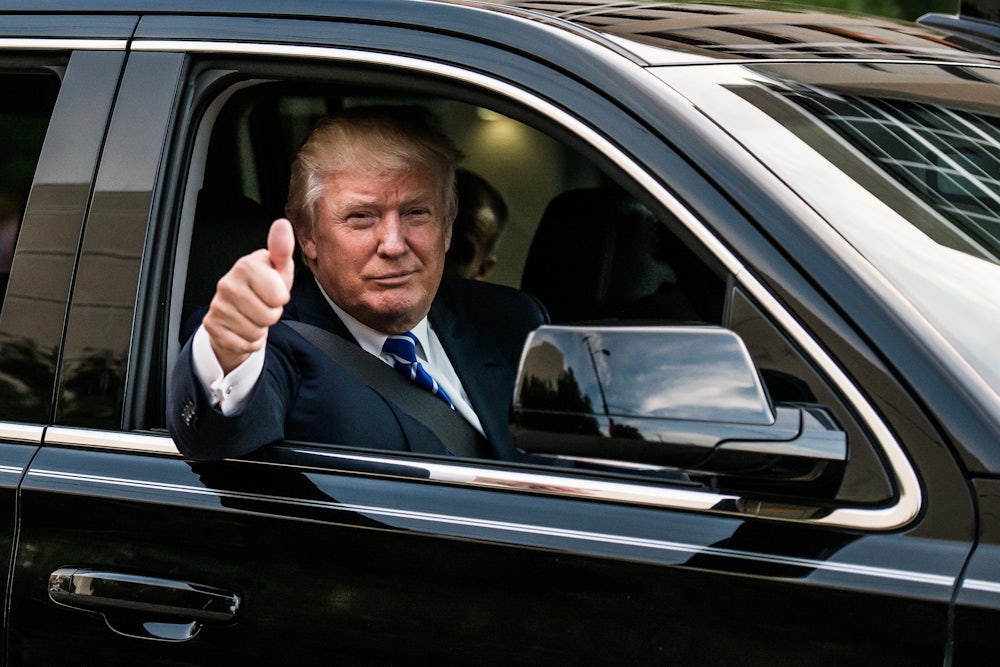To account and correct for the Republican presidential primary’s vast and unwieldy field of candidates, the first six GOP debates this cycle have featured both an undercard and a main event. On Thursday night, thanks to an on-again-off-again feud between Fox News and Donald Trump, we’re expecting something entirely new: an undercard, a main event, and a sideshow. What’s unclear is whether the sideshow will be the debate among the other leading candidates, or Trump’s protest counter-program.
Trump’s decision to skip the final pre-Iowa debate in Des Moines has been interpreted many ways—as a stroke of genius, a sign of weakness, an impulsive dash toward the limelight. But the question of its effectiveness as a ploy is less important than what it says about the totalizing effect Trump has had on the race and the Republican Party.
Almost without even trying, Trump has become the GOP’s indispensable man. If his rivals, and other Republican Party actors, were uncomfortable with him inside the tent, they are also uncomfortable when he leaves—only much more so. The half-hearted taunting from Fox and anti-Trump Republicans, who claim Trump is simply scared of moderator Megyn Kelly, provides poor cover for that awkward but evident truth.
By bailing on the debate and hosting a simultaneous public event, Trump has pocketed most or all of what he’d hoped to get out of Thursday night’s originally planned festivities—limelight, distinction, narrative control—while everyone else has not. His departure will cost Fox News millions of eyeballs, and as many dollars in lost revenue. New York magazine’s Gabriel Sherman—better sourced within Fox than anyone else on the media beat—depicts the network in chaos, badly divided between pro-Trump and pro-Kelly factions. He reports that CEO Roger Ailes “is fighting off criticism from his senior executives over his handling of the crisis,” and has become “frantic” to re-enlist Trump. (As of this writing, the Trump campaign says his decision stands.)
As valuable as the audience was to the network, it was more valuable still to the candidates who will be left debating without him—many of whom were desperate for free press, or badly needed to set themselves apart from Trump on the same stage.
Trump’s closest rival in Iowa and across the country, the increasingly nervous Ted Cruz, proposed a counteroffer at a rally in Iowa after Trump announced he was pulling out: a one-on-one debate moderated either by a more congenial host, or by no moderator at all—“90 minutes, you and me, mano-a-mano, Lincoln-Douglas style.”
To campaign obsessives, the Lincoln-Douglas debate proffer is a familiar mark of desperation–one that arises when a challenger is losing badly, or when there’s little time for him to make up lost ground.
Protip: When you suddenly start demanding Lincoln-Douglas debates without a time limit, you are signaling you’re losing.
— Erick Erickson (@EWErickson) May 29, 2014And Cruz has been losing ground.
To further bait Trump, Cruz also mimicked the GOP establishment’s critique of Trump’s decision: “I promise you Putin is a lot scarier than Megyn Kelly. I’d like to hear Donald explain to the American people and to the people of Iowa how he is prepared to be commander-in-chief if he’s terrified by a television host.”
This line would be more effective in a different campaign, or even within this campaign against a different candidate. But against Trump, in this race, it sits in direct contradiction to a major point of partisan consensus. A central tenet of the Republican debate, and a frequent rallying cry on the trail, is that President Obama has served the country poorly by tipping his hand to foreign adversaries, that reaching accord matters more to him than any specific terms. Obama was never willing to push back from the table with China or Iran or any other country, according to this critique, because feathers in his cap are always the ultimate goal. He surrenders his leverage on purpose, at America’s expense.
Trump’s success in the race thus far is largely attributable to his insistence that he—more than anyone else in the party—won’t be so easily snookered. Withdrawing from Thursday’s debate demonstrates—in an antic, contrived way that perfectly aligns his Apprentice-era stagecraft, his real-estate-king persona, and the GOP’s parody-defying depiction of Obama’s presidency—that he’s willing to walk away from a bad deal.
The best way to divine Trump’s strategic thinking isn’t by scrutinizing the circumstances surrounding his withdrawal (his feud with Kelly, his fragile lead in Iowa), but by examining what the decision reveals about who’s in command and who’s not. When you look at it that way, it’s obvious.
